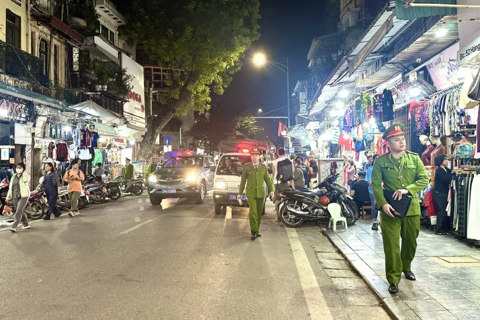In memory of Hanoi: Resistance youth turn prisons into revolutionary schools
The harsh prison regime, with its cruel tortures, could not break the will and patriotism of the communist fighters.
The enemy mercilessly crushed the revolutionary movement, resenting the impact of the Nhua Song (Life Essence) newspaper and many other activities of the young people in the capital.
Iron will in hell on earth
At the beginning of the 1950-1951 school year, after learning of the resistance army's resounding victory in the border battles, the Trung Vuong Student Resistance Group of Do Hong Phan proposed a plan to celebrate the victory by hanging the red flag with a yellow star in the city, distributing leaflets against the French invaders, and so on.
On November 7, 1950, the celebration was a great success, thrilling the hearts of the young people of Hanoi but alarming the enemy. Many Trung Vuong students were arrested, including Phan.
"At the secret service station, they slapped me in the face during the interrogation. Then they took me to prison. I and other friends were tortured," Phan shuddered as she recalled.
| Do Hong Phan (left) and her friends in the young people's movement against the French colonialists. File photo |
Although the electric shocks made her entire body shake, she was adamant that she would not confess. Phan even tried to end her life by smashing the rice bowl she was eating from and cutting the veins in her hand.
French soldiers took her to Phu Doan Hospital (now Viet Duc Hospital) to keep her alive. Here she was put in a private room with two guards day and night. When she recovered, Phan was transferred to Hoa Lo Prison.
Here Phan endured beatings and was cared for and encouraged by female political prisoners. After more than two months, the French colonialists released her on January 21, 1951, because she was under 18.
Another member of the youth resistance movement imprisoned in Hoa Lo prison was Duong Tu Minh, the youngest son of the famous educator Professor Duong Quang Ham.
| Hoa Lo Prison is a place where many young people in Hanoi are detained and tortured. File Photo |
While studying at Chu Van An School, Minh and his sister, Duong Thi Cuong, published secret newspapers, distributed leaflets, hung banners, and propagandized for the resistance.
In the summer of 1950, the enemy launched a terrorist crackdown on the movement, arresting more than 100 students, including Minh and his sister, who were released after two weeks for lack of evidence.
Shortly after his liberation, Minh joined the Hanoi National Salvation Youth Union. He was one of the people who actively participated in printing and publishing the Nhua Song (Life Essence) newspaper.
In October 1952, Minh's home printing press was denounced. At the age of 17, Minh was arrested for the second time.
Because he was an active member of the movement, he was severely tortured in the infamous Hoa Lo prison.
"The prison guards fed us rotten food, humiliated the prisoners, then beat us and sprayed us with powerful water hoses," Minh said.
Because Minh refused to confess, the colonial government had no reason to continue holding him and issued a temporary release order, setting him free.
| Hanoi youth's struggle reenacted at Hoa Lo Prison Relic. Photo: Ngo Minh/The Hanoi Times |
Revolutionary struggle in colonial prison
Minh said that despite the harsh prison regime with cruel torture, the enemy still could not break the will and patriotism of the communist soldiers. The prisoners were still steadfast and determined not to make any statement and found ways to dig tunnels and escape from the prison.
Communist inmates turned the prison into a training school. Political and cultural classes were secretly held by the Hoa Lo Prison Party cell. There were no school supplies, so the cement floor was turned into a blackboard and quicklime was used as chalk.
Over the years, time can erase many things, but for Minh, the days of fighting the enemy in this "hell on earth" will never be forgotten.
Another revolutionary soldier in Hoa Lo prison was the meritorious teacher Nguyen Tien Ha (birth name Nguyen Huu Tu, born in 1928).
In May 1950, he was captured by the enemy and taken to the Secret Service (now the Hanoi City Police Headquarters at 87 Tran Hung Dao).
Although he was mercilessly beaten by the enemy, he never said a word. Ha tried to dig a wall to break out of prison with some other friends in the Secret Service compound.
They studied the layout of the prison, both inside and out, and memorized the rules of the guards' and secret agents' patrols.
The foursome managed to escape, but on the way back to the base they were recaptured by the enemy. Even after being tortured more severely this time to force him to denounce his comrades, the devout Communist soldier remained silent.
"They hung me from the rafters and gave me an electric shock, then pushed me into a tank of water, but we were determined not to surrender," Ha recalled.
| Students in Hanoi protested against the war. File Photo |
After his near-fatal beating, Ha was transferred to Hoa Lo Prison. Here, with the support and medication of his comrades, his health began to recover. After being elected to the Party committee by his fellow inmates, he was appointed Party secretary of the prison. He continued the struggle inside the prison, where he set up classes in politics, culture, and foreign languages.
At the end of 1952, the enemy released Ha as they had no evidence to convict him. Immediately after leaving prison, he changed his name to Professor Tran Huu Thoa and continued his revolutionary activities related to education.
Thus, the persistent and heroic revolutionary struggle of the people of Hanoi contributed greatly to the final victory, and on October 10, 1954, after nine years of resistance against the French, the liberation army marched into the capital, the national flag flying proudly atop the Hanoi Flag Tower.
Part 1: 70 years after Hanoi Liberation: Remembering Victory Day















